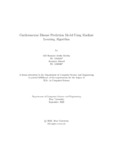| dc.contributor.advisor | Mostakim, Moin | |
| dc.contributor.author | Arefin Mirdha, MD Shamsul | |
| dc.date.accessioned | 2023-03-28T04:54:41Z | |
| dc.date.available | 2023-03-28T04:54:41Z | |
| dc.date.copyright | 2022 | |
| dc.date.issued | 2022-09 | |
| dc.identifier.other | ID: 12101037 | |
| dc.identifier.other | ID: 14301067 | |
| dc.identifier.uri | http://hdl.handle.net/10361/18023 | |
| dc.description | This thesis is submitted in partial fulfillment of the requirements for the degree of Bachelor of Science in Computer Science and Engineering, 2022. | en_US |
| dc.description | Cataloged from PDF version of thesis. | |
| dc.description | Includes bibliographical references (pages 60-62). | |
| dc.description.abstract | This research uses machine learning to anticipate and detect the symptoms of specific diseases after examining some of the important elements of these diseases in
order to better understand them and develop new and better treatment techniques.
This study uses machine learning and generated data sets to evaluate and categorize the signs and symptoms of heart diseases. We’d like to see whether we can
improve individual disease prediction processes so that we can predict cardiovascular diseases and their modalities more accurately. Therefore, the aim of this study
is also to develop a more diversified model from the existing ones. We are focusing
on cardiovascular diseases, which is among the world’s top causes of death. Multiple machine learning (ML) algorithms are being used more frequently to predict
cardiovascular disease. We want to evaluate and describe how well ML algorithms
generally forecast cardiovascular illnesses. This research analyzes the classification
of cardiovascular disease using machine learning methods including Random Forest
(RF), Logistic Regression, Decision Tree, Na¨ıve Bayes, Linear Algorithm, Support
Vector Machine (SVM), K-Nearest Neighbor (KNN) and Neural Network. We anticipate finding effective and efficient results that will aid in better diagnosing these
cardiovascular diseases and also will help us for developing better treatment procedures. | en_US |
| dc.description.statementofresponsibility | MD Shamsul Arefin Mirdha | |
| dc.description.statementofresponsibility | Anannya Ahmed | |
| dc.format.extent | 62 pages | |
| dc.language.iso | en | en_US |
| dc.publisher | Brac University | en_US |
| dc.rights | Brac University theses are protected by copyright. They may be viewed from this source for any purpose, but reproduction or distribution in any format is prohibited without written permission. | |
| dc.subject | Cardiovascular Disease | en_US |
| dc.subject | Machine Learning | en_US |
| dc.subject | Random Forest (RF) | en_US |
| dc.subject | Logistic Regression | en_US |
| dc.subject | Decision Tree | en_US |
| dc.subject | Na¨ıve Bayes | en_US |
| dc.subject | Linear Algorithm | en_US |
| dc.subject | Support Vector Machine (SVM) | en_US |
| dc.subject | K-Nearest Neighbor | en_US |
| dc.subject.lcsh | Neural networks (Computer science); | |
| dc.subject.lcsh | Artificial intelligence | |
| dc.subject.lcsh | Machine learning | |
| dc.title | Cardiovascular disease prediction model using Machine Learning Algorithm | en_US |
| dc.type | Thesis | en_US |
| dc.contributor.department | Department of Computer Science and Engineering, Brac University | |
| dc.description.degree | B. Computer Science | |

